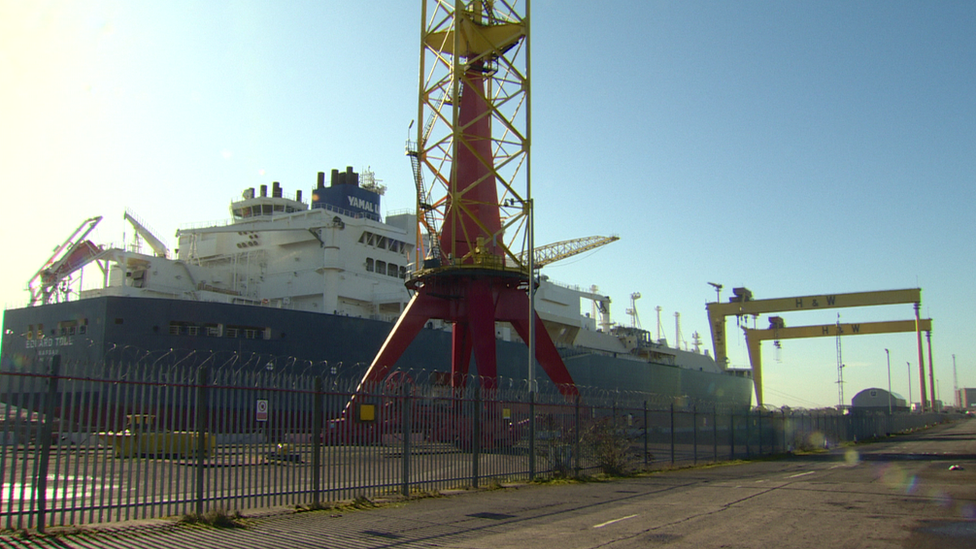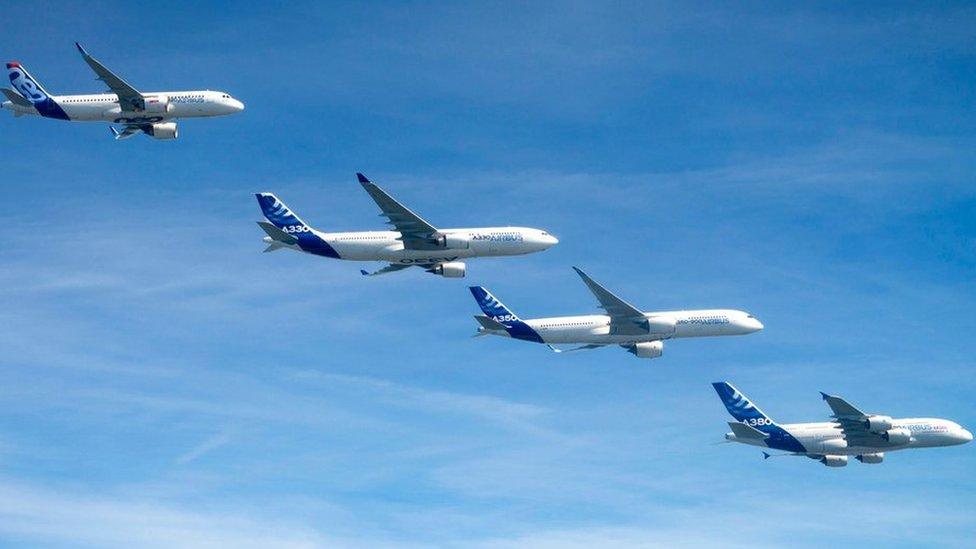UK ports 'working at pace' to block Russian ships
- Published

The status of a Russian-chartered tanker in Belfast harbour is unclear after the UK government banned all ships with a Russian connection.
UK ports are "working at pace" to block Russian ships after the UK passed a law banning them from entering port, a trade body has said.
The UK was the first country to make such a move due to Russia's invasion of Ukraine, and the EU is considering a ban.
Russian ships are diverting, are at anchor, or are being packed up, the UK Major Ports Group said.
However, the ban is unlikely to add to pressure on fuel prices, the RAC said.
UK Transport Secretary Grant Shapps announced on Tuesday that the UK had become the first country to pass a law banning ships with "any Russian connection" from entering its ports.
On Wednesday, Tim Morris, chief executive of trade association the UK Major Ports Group, told BBC Radio 4's Today programme that some Russian-linked vessels had already been denied access to UK ports, while others were diverting their routes.
He said: "Right now what we're seeing is some vessels related to Russian interests divert on the way to the UK. Some are at anchor off the coast of the UK, having been denied access to our ports, and are working out what they do next.
"And the vessels that were here already have been packed up and dispatched as quickly as safety allows. So we are all working at pace, alongside the government, to play our role against the very troubling situation that we see in Ukraine."
Diesel imports
He said working out which vessels were Russian-flagged was relatively straightforward, but it was more difficult for ports to work out which were owned and operated by firms with Russian interests.
Ports have been working with government so they "have the best sight that we can" of which vessels are of interest, he said.
Mr Morris said Russian trade made up only about 2% to 3% of total traffic that moves through UK ports.
But there are some particular concentrations in trade in commodities like oil, liquefied natural gas and some agricultural products.
He said: "It's unlikely to be a supply problem but it certainly feeds in as part of the broader debates… about energy products."
Russia is one of the major suppliers of oil to the UK. In 2021, Russia was the third largest country that the UK sourced its oil from, with 13% of imports for the year.
The UK is by no means reliant on Russia for crude oil. In 2021, the UK got only 6% of its crude oil imports from Russia.
Supplies
But the UK buys a lot of its diesel from Russia. In 2020, Russia was the largest source country for UK diesel.
Together, Russia, the Netherlands, and Saudi Arabia accounted for 62% of total road diesel imports.
Petrol and diesel prices in the UK have been hitting record highs as the price of crude oil has risen due to the Russian invasion of Ukraine, which came on top of increased demand as countries recover from the coronavirus pandemic.
However, RAC fuel spokesman Simon Williams said that the ban on Russian ships was unlikely to add to pressure on fuel prices, as Russian diesel could be shipped in as cargo by firms from other countries. He added that there is diversity of supply.
"It depends what the ships are flagged under," he said. "We also deal with other countries."

THE STORY OF MIWSIG: Eleri Price and Huw Stephens time travel with Welsh language pop
MARGINS TO MAINSTREAM: Michael Sheen introduces new writers revealing their truths

Related topics
- Published2 March 2022

- Published2 March 2022
